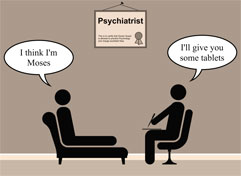
Consumer Beware
Whenever the therapist threatens his client, he may get the client to temporally submit to his will but he is damaging the client in the process...

Think about this: What would you do if a therapist told you that you are forbidden to speak to your Rabbi or anyone else about your situation while you are in her “care”? And if you do, she won’t work with you and maybe your wife will divorce you as a result. Does a therapist have the right to do that? Let’s take another situation: Does a therapist have the right to threaten a client that she will call the secular authorities (even if there is no reason to call them other than to intimidate and frighten the person into continuing therapy?)
Consumer beware: I have heard that there are some “therapists” who call themselves “trauma therapists” or something like this, and what they are doing with people is very dangerous. There was one time where the trauma therapist told someone that in order to get cured he would need to get in touch with his violent tendencies (which with the help of his Rabbi he had kept in check for more than 10 years). The “therapist” literally coerced this poor guy into submitting to this “violence therapy” because he had no way out. The therapist had won the wife’s trust and convinced her that she should divorce him if he didn’t submit to the “treatment”, so he was afraid to deviate as much as an iota from whatever the therapist made him do.
By the way, the “therapist” seemed (to both of them) initially to be very helpful. She impressed them with her “intelligence” and her ability to understand what they needed very quickly. The couple liked the therapist’s style which was to structure the sessions very tightly and keep them focused. Little did they know what was to come.
The desperate unsuspecting couple were further misled by the therapist’s fine lineage – which she drew their attention to from the outset. They told me: “This therapist is guru-genius sent to us by G-d. Not only is  she an expert in ‘trauma therapy’ but her grandparents were such holy Jews to boot.”
she an expert in ‘trauma therapy’ but her grandparents were such holy Jews to boot.”
The sadistic therapist diagnosed him with PTSD (post-traumatic stress disorder). They were then told that he suffered from pent up rage that he has been holding onto for his whole life (from some mysterious trauma or series of traumas that he experienced as a child). He was told: “You couldn’t express all the pent up rage that you had as a child and it’s been kept in repression ever since. So what you need to do now is to let it all out! Then, you’ll feel so much better and you’ll have a great marriage too.”
What was the treatment she gave him? She forced him to meditate on violent imagery in her office. What was the result? He actually did become violent – lucky thing for the therapist that this guy didn’t put her into permanent retirement on the spot – that’s what he really wanted to do. But instead of the therapist getting it, some innocent guy on the street got it that very day – the poor guy must have said something wrong and bam – he got his cell phone grabbed away and smashed into pieces on the ground.
The Torah does not condone this type of “therapy” which provokes people to become angry and violent. Yes, there is room within a Torah-based approach to therapy for venting pent up emotions but only in ways that allow the person to maintain a stable emotional connection to himself and the people around him. Whenever the therapist threatens his client, he may get the client to temporally submit to his will but he is damaging the client in the process. When there are threats there can be no trust or respect. The therapist is no longer a model of Jewish values for the client to emulate but he becomes a feared person. Rabbi Arush teaches us how to have so much trust in G-d that we need not fear people – only G-d. Yet this type of therapist is intentionally trying to get people to fear her.
There is also something called differential diagnosis, which means that each person’s strengths and weaknesses need to be understood very well (even before encouraging a person to vent normally). The process of therapy will always require the person to face certain unpleasant things about themselves in order to grow past them – but therapies that rip away all of a person’s defense mechanisms at once are cruel and dangerous. I have found that therapists that use these types of provocative techniques have their own problems with wanting to control, manipulate, and sadistically provoke their clients. They really want to do this with all people but they could never get away with that in their personal lives. But in their professional lives they have an outlet for their sadism. They violate their patients trust and dependency on them as professional helpers.
A lot of skill in diagnosis is critical in helping people who have underlying issues with rage. I had a student once, who hypnotized a man to stop smoking before he knew anything about the man he was hypnotizing or what effect the cigarettes were having on him. He didn’t realize how the cigarettes were keeping the man’s pent up anger in check. He was successful in getting the man to stop smoking in one session, but unfortunately the man went home and traumatized his family – beating his wife and children until the police arrived.
I know another therapist who also enjoyed getting his patients riled up. This doctor got himself so badly beaten up that he had to spend some time in the hospital himself. He ended up taking an early retirement. I heard about another therapist who pushed his patient too far and the patient went berserk and completely trashed the doctor’s fancy office furnishings. Lucky for the doc it was only his stuff and not him. I worked with the same patient (after he was released from the hospital). I never once had a concern about his anger problem. In fact I had him over the house to meet my wife and kids. What he needed wasn’t teasing and provoking, what he needed was someone to give him faith, understanding and hope.
Can an abused or traumatized person heal in a setting in which he is being abused and traumatized by his therapist? Obviously not. You can learn more about this topic in my original article on this topic: Sadism Therapy.











Tell us what you think!
Thank you for your comment!
It will be published after approval by the Editor.